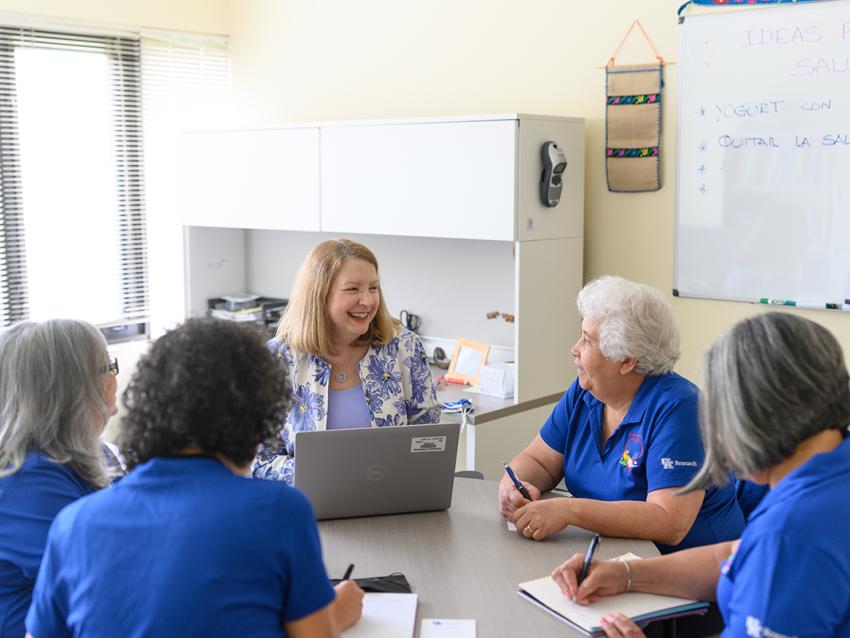
CDC PANDEMIC Grant Funds Vaccination Outreach Through Community Health Workers, Extension Agents
A team from the University of Kentucky Center for Clinical and Translational Science (CCTS) is partnering with colleagues at seven academic health systems to boost COVID-19 and influenza vaccination rates in parts of the country where health care skepticism is common and vaccination rates are low. Funded by the PANDEMIC (Partnering Program to Alleviate National Disparities in Ethnic and Minority Immunizations in the Community) grant from the Centers for Disease Control and Prevention (CDC), the program is a collaborative effort between university faculty, community health workers (called promotoras in Spanish), and extension agents to meet community members where they are.
The program aims to reach groups that may experience immunization and other health disparities, including racial and ethnic minorities, people with disabilities and chronic health conditions, older adults, and people living in rural communities.
The Kentucky team is focusing on engaging urban Black and Latine populations in Fayette County as well as rural residents of six counties: Boyle (currently 55% fully vaccinated), Garrard (currently 46% fully vaccinated), Jessamine (currently 51.4% fully vaccinated), Madison (currently 45.9% fully vaccinated), and Mercer (currently 52.4% fully vaccinated,. These locales were selected because no other grant-funded activities were underway to increase their low vaccination rates.
Gia Mudd-Martin, PhD, MPH, RN, director of the UK CCTS community engagement core and the UK lead for this project, explains that technology, language, false information, and homelessness present significant barriers to vaccine access for many communities. This program, she says, is designed to help the CDC understand such gaps in vaccination and effectively strategize to address them.
‘This is a tremendous and unique model that simultaneously leverages the capacity of the UK CCTS and peer centers, the community health worker model, local health departments, and extension agents—each of whom have expertise to share in engaging with their communities—to recognize vaccination barriers, conduct disease surveillance, and increase rates of vaccination,” she said.
“And this effort is really driven by the community health workers, who are known for engagement with the communities. Because they’re part of their communities, they understand barriers to vaccination, both from standpoint of what people believe about the vaccine and their access to it. So they provide invaluable insights, and help us develop and implement strategies and then they implementing the strategies.”
Six community health workers will be hired for this effort in Kentucky. They’ve already begun distributing a tablet-based survey at vaccination sites and community events to ask people their thoughts on COVID, what they’re hearing about the vaccines, and if they think vaccination is important.
“Understanding these viewpoints will inform how we direct our efforts. So far, people have been very interested in sharing their opinions, which shows that we’re dealing with strong opinions about COVID,’ Mudd-Martin said.
In addition to Mudd-Martin, the UK team includes Philip Kern, MD, director of the CCTS and co-PI for the project, as well as co-investigators Lovoria Williams, PhD, RN, FNP-BC, FAANP, co-director for special populations at the CCTS; Jennifer Hunter, assistant director of the UK extension program; and Natalie Jones, extension specialist for family health. Ashley Hall, MS, the CCTS community engagement project manager, currently serves as coordinator of the CDC program grant.
The program, with a budget of $6 million in its first year, is supported by the CDC’s Partnering for Vaccine Equity program, which awards more than $156 million to partners across the country to help them improve adult vaccination access and increase vaccination rates.
The University of Florida (UF) received the grant and channeled funding for the initiative to partnering teams from the University of Minnesota, Washington University in St. Louis, Montefiore Medical Center, the University of Kentucky, the University of Missouri, Florida State University and the University of California, Davis; all lead their Clinical and Translational Science Award, or CTSA, community engagement programs. The communications agency Health Literacy Media is also part of the team.
“This project brings together talented and dedicated scientists who have worked together and with community partners through the CTSA initiative for many years to contribute to the science of community engagement. I am particularly excited to blend the efforts of community health workers and county extension agents,” said Linda B. Cottler, Ph.D., M.P.H., who leads the new grant and is the senior associate dean for research at the UF College of Public Health and Health Professions, part of UF Health, the University of Florida’s academic health center.
UF chose the partner sites on the basis of high vaccine hesitancy rates, limited access to health services and high rates of health conditions associated with poorer health outcomes. UF was selected for funding based on the existing relationship and structure of HealthStreet’s community engagement programs paired with the County Extension model that brings education and information to local residents.
###
UK Media Contact: Mallory Profeta, mallory.profeta@uky.edu
